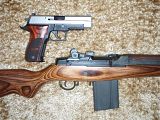Page 1 2
Go  | New  | Find  | Notify  | Tools  | Reply  |  |
| Member |
There was a recent thread about recommendations for the best drill bits here: https://sigforum.com/eve/forums...910084454#6910084454 But my question is more specific. I have ruined several cheap drill bits (home depot etc.) trying to drill through angle iron, until I found a new Dewalt branded "Cobalt" drill bit that drilled through the angle iron like a hot knife through butter. So my question is, are "Cobalt" type drills the type I should always get if I want to drill through mild steel plate and angle iron ? Or is that a generic or marketing term for Dewalt ? Is there a more specific industry standard term or material that bits are made of for drilling plate steel and angle iron that I should be looking for ? I'm not talking about drilling any specialized or exotic metals, just plain old plate and angle iron steel. I'm done ruining and breaking cheap drill bits with near zero progress getting through my work pieces. If you know the answer please translate any technical terms or industry jargon in advance, since I'm not a tradesman of any kind. As always thanks in advance to the great Sigforum Brain Trust. Lover of the US Constitution Wile E. Coyote School of DIY Disaster | ||
|
Lost |
In order of toughness: Titanium – High speed steel bits which have been coated with titanium nitride. This special coating gives the bits a very high surface hardness to help penetrate tough materials, makes the bits highly corrosion resistant and significantly reduces friction between bit and workpiece. Titanium coated bits last up to 6X longer than standard high speed steel bits. For metal, wood, and plastic. Cobalt steel: harder than carbon steel, used to drill stainless and other harder materials, including titanium. Carbide steel: usually tungsten carbide. Even harder, can drill virtually any workplace material. | |||
|
| Member |
I'm certainly no metal working expert but I always buy "cobalt" drill bits, for almost everything I drill into. I'm looking forward to seeing the responses from the experts on the forum to your question. | |||
|
Member |
Your not drilling through bed frames are you? If this is proper hot rolled angle iron, most any decent bit will be fine. You're probably drilling at too high an RPM. Try a slower speed with heavy, consistent pressure, minimize any variation in entry angle (keep the bit perpendicular to the workpiece) and use some proper lube, preferably other than the ubiquitous WD40. Hot rolled steel will have mill scale on the surface. This scale is harder than glass I've been told and will put a hurtin on the bit until you get the full diameter through the layer. | |||
|
Honky Lips |
I see no reason not to use tungsten carbide bits exclusively. | |||
|
Member |
Run of the mill angle iron is made of A36 steel. Commonly called mild steel. Rather soft and easy to machine or weld. You can drill it with anything from carbon steel drills up to tungsten carbide.. Anything designed for drilling metal will work. Tougher drills, such as m40hss, cobalt and carbide will usually last longer, but not always. HSS drills are tough and work well on steels up to about 45hrc. Cobalt will let you drill stuff up to mid 50s hrc. Carbide is hard and lets you cut metals up to low 60shrc, but its brittle. I would avoid carbide drills for handheld drill motors, as the lack of rigidity leads to chipped cutting edges. Carbide is great for big drill presses, engine lathes and milling machines. I use carbide end mills and turning tools for rapid roughing on my CNC equipment, but on less rigid equipment HSS and cobalt last much much longer. | |||
|
| Bookers Bourbon and a good cigar  |
Don't be like my neighbor, trying to drill angle iron with a masonry bit. Doh! BIDEN SUCKS. If you're goin' through hell, keep on going. Don't slow down. If you're scared don't show it. You might get out before the devil even knows you're there. NRA ENDOWMENT LIFE MEMBER | |||
|
| member |
Just as important as the bit and feed speed (pressure on drill), is using cutting oil. There are many choices for this. Search "cutting oil". It will make your bit glide through the metal. When in doubt, mumble | |||
|
Certified All Positions |
Do you have a drill press, or just a handheld drill? Either way, low speed with some form of lube, and use a center punch, then a pilot, before your full size bit. Depending on the size of the hole and the thickness of steel, and what tools you have, you can drill a pilot, then a few sizes of bit before your desired hole size. Arc. ______________________________ "Like a bitter weed, I'm a bad seed"- Johnny Cash "I'm a loner, Dottie. A rebel." - Pee Wee Herman Rode hard, put away wet. RIP JHM "You're a junkyard dog." - Lupe Flores. RIP | |||
|
| semi-reformed sailor |
What’s the deal with the stepped drill bit...I’ve seen them a lot on tv shows but never seen anyone use one in real life.... "Violence, naked force, has settled more issues in history than has any other factor.” Robert A. Heinlein “You may beat me, but you will never win.” sigmonkey-2020 “A single round of buckshot to the torso almost always results in an immediate change of behavior.” Chris Baker | |||
|
| Member |
Do you use a specific brand ? I don't see cobalt drills in the big box building materials stores. Lover of the US Constitution Wile E. Coyote School of DIY Disaster | |||
|
Member |
Step bits (unibits) are great for enlarging an existing hole while keeping the center true in thin gauge metal. They are primarily used in electrical work for installing standardized conduit fittings. They work in thicker materials too while sacrificing bit life, but they are quite durable due to their design. When used with thicker material they will leave a "step" in the hole requiring coming at the hole from the opposite side to achieve the desired diameter. They are great for plastics as well. I use mine often. Buy a Lenox or Greenlee and not a cheap set from harbor freight if you intend on drilling steel. | |||
|
Member |
If anyone drills holes frequently, buy a drill press if the items are small enough to fixture on the table. Drill bits will last many times beyond what you'll get freehand. In my Bridgeport milling machine, I have drilled 216 7/16" holes in 5/8" A36 hot rolled steel with one bit and it's still trucking. That is nearly 12 feet worth of hole with one bit. While the Bridgeport is more ridgid than a hardware store drill press, staying true to the hole with good pressure will greatly improve service life and hole quality/accuracy. | |||
|
| Yokel |
You would be surprised what a good quality aerosol cutting oil will do even on a cheap drill bit. Slow speed is your friend. Beware the man who only has one gun. He probably knows how to use it! - John Steinbeck | |||
|
His Royal Hiney |
cutting fluid is key to cooling the drill bit. "It did not really matter what we expected from life, but rather what life expected from us. We needed to stop asking about the meaning of life, and instead to think of ourselves as those who were being questioned by life – daily and hourly. Our answer must consist not in talk and meditation, but in right action and in right conduct. Life ultimately means taking the responsibility to find the right answer to its problems and to fulfill the tasks which it constantly sets for each individual." Viktor Frankl, Man's Search for Meaning, 1946. | |||
|
| Member |
I’ve found the Dewalt pilot point cobalt bits to work well as long as you use cutting fluid. They’re less brittle than carbide so handheld is feasible, much less expensive than carbide and have a designed-in starting tip that’s smaller than the main diameter (at least on the larger bits) that eliminates predrilling with a smaller bit first. Drill press works best with them, but handheld if you’re careful and use cutting fluid is doable. | |||
|
Drill Here, Drill Now |
The DeWalt's are supposed to be M37 Cobalt. M42 is 8% cobalt high-speed tool steels which is slightly better than the M37 (5% cobalt high-speed tool steels). M42 Cobalt bits along with cutting oil should perform better and getting rid of the DeWalt price tag should lower the cost. Ego is the anesthesia that deadens the pain of stupidity DISCLAIMER: These are the author's own personal views and do not represent the views of the author's employer. | |||
|
| Member |
I use them constantly. I use them mostly on aluminum, but they work on steel, and they're very handy, and do a good job of dressing or deburring the edge of a hole, so long as it needn't be too precise. For mild steel like angle iron, a high speed steel bit works fine. Slow speed, use moderate pressure, and lubricate the cut. If you don't have cutting oil, use WD40 (which isn't actually an oil, but better than nothing). Cutting oil is best. Always best to drill a pilot hole first with a smaller bit, then proceed with the larger bit to keep it centered and keep it from walking, if it can't be clamped in a press. | |||
|
| Member |
I always drill with black oxide. I start small and work my way up. I will use oil if I have to. The titinium seem to dull out faster for me. Let all Men know thee, but no man know thee thoroughly: Men freely ford that see the shallows. Benjamin Franklin | |||
|
Quit staring at my wife's Butt |
are you sure the drill bit is going the right direction ? I kid you not I had a friend of mine ruin 4 drill bits. until he figured it out. I just use American made hss drill bits with some lube never buy them at the big box stores but go to industrial supply. | |||
|
| Powered by Social Strata | Page 1 2 |
| Please Wait. Your request is being processed... |
|
© SIGforum 2024